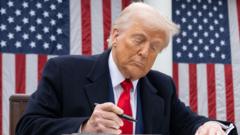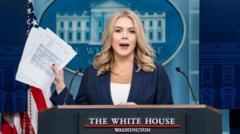Mexico's President Claudia Sheinbaum has successfully negotiated a one-month delay on tariffs with the Trump administration just before they were set to activate, offering temporary relief to both nations. Meanwhile, Canada braces for economic challenges as relations with the U.S. remain tense.
Mexico Secures Tariff Delay Amidst Rising Tensions with Canada

Mexico Secures Tariff Delay Amidst Rising Tensions with Canada
President Claudia Sheinbaum of Mexico reaches a deal with the U.S. to delay tariffs, while Canada faces potential financial repercussions from ongoing trade disputes.
Mexico's President Claudia Sheinbaum has announced a significant tariff delay in negotiations with the Trump administration, granting a reprieve just hours before heavy tariffs were scheduled to take effect. Originally set at 25 percent, these tariffs threatened to impact Canada severely, causing concern over the economic ramifications of the escalating trade disputes.
In a related development, President Trump solidified plans for a continual 10 percent tariff against China while directing warnings towards the European Union, suggesting impending tariff actions. Following the announcement of the Mexico deal, there was a notable recovery in stock markets that had initially reacted negatively to prior global market declines.
Key to the negotiations was a newly established agreement regarding border security, which commits Mexico to deploying an additional 10,000 troops to its border with the U.S. As talks unfolded, Trump reiterated his grievances regarding Canada, emphasizing that he believes the U.S. does not require Canadian resources for certain industries, including automotive manufacturing and agricultural products, and even expressed a wish for Canada to join as another U.S. state.
While the U.S. auto industry appears to have alleviated immediate worries regarding the tariff situation with Mexico, Canadian exporters still face uncertainty. Canada’s absence from this agreement could lead to significant price increases as American consumers may bear the brunt of unchecked tariffs.
In response to ongoing political dynamics, Democratic lawmakers protested outside an agency responsible for foreign aid, which Elon Musk has indicated might face closure. Additionally, the U.S. government is preparing for an influx of up to 30,000 deportees to Guantánamo Bay amidst a backdrop of socio-political tensions.
The implications extend beyond trade, encompassing broader narratives on international relations, national security, and current governance practices, as highlighted by criticism directed towards the recent actions of the Trump administration on culturally sensitive policies such as the revision of CDC guidelines regarding gender-specific terminology. The Senate Intelligence Committee is also poised to vote on Tulsi Gabbard’s nomination for director of national intelligence, further embedding these political tensions within a larger context.
This evolving landscape showcases the delicate balance of international trade agreements, national security, and internal political discourse, revealing the interconnected nature of global economies and domestic policies.





















